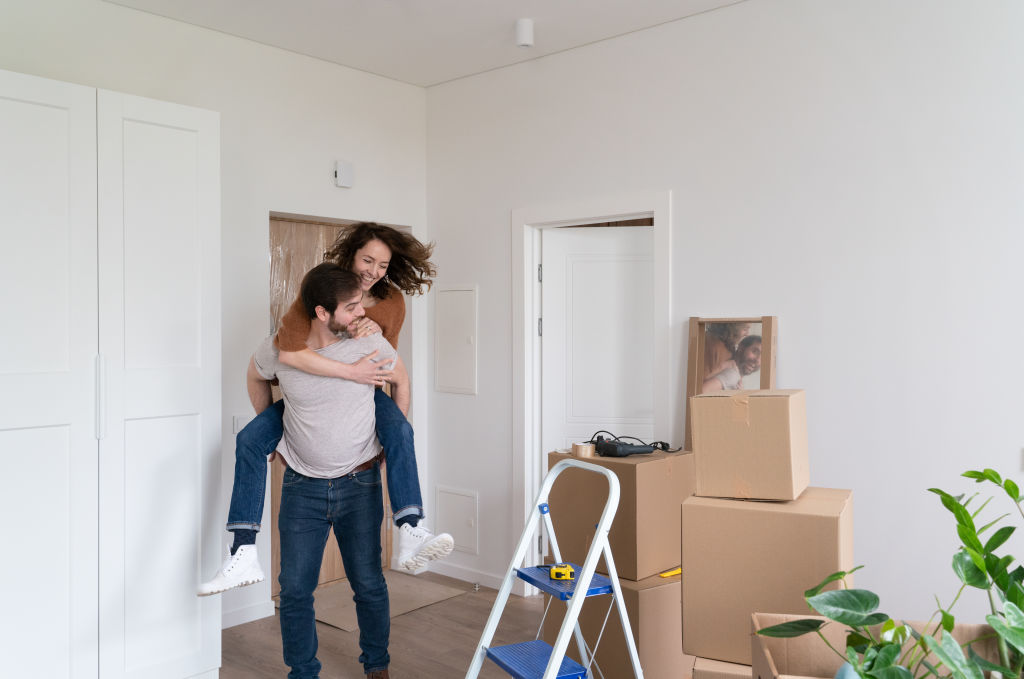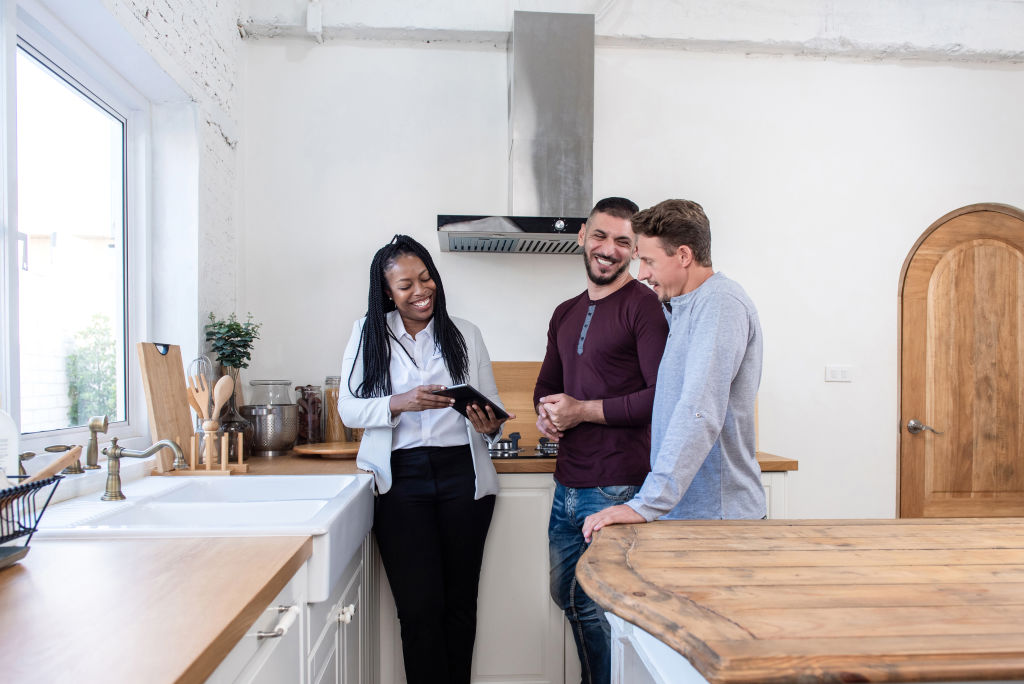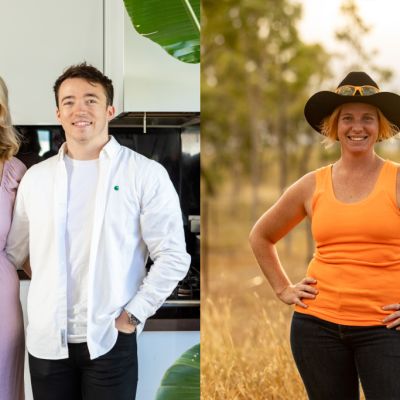House versus wedding: the conundrum many Australians are facing

All my friends are getting married,” sang Aussie rockers Skyhooks. Not so now. With census-based Australian Bureau of Statistics (ABS) data showing a drop of almost 31 per cent in weddings from 2019 to 2020, tracking a declining trend in the marriage rate, the new version of the song could be, “All my friends are buying houses.”
“The majority of first-time buyer couples are not married – the vast majority,” says buyers advocate Cate Bakos, of Cate Bakos Property.
“Marriage is not really part of it,” she says of her many clients buying as a couple. “The more significant consideration is the type of dwelling, based on their plans.”
It’s a trend partly driven by the pandemic and the wedding-guest limits that were enforced.
“I’ve seen a significant number of first-time buyers … cancel the wedding or put the wedding on hold as a result of the pandemic,” Bakos says, adding that she has also seen “deferred or downgraded wedding plans as a result of the property prices”.

Several clients have eloped. “They have been able to get a better property,” Bakos says.
Greg Cusack, Jellis Craig Brunswick director, agrees.
“I am seeing that a lot now,” he says. “The setting up of the house and joint ownership is a priority, more so than the lavish, expensive wedding.”
Cusack notes that this pre-pandemic trend has been “amplified in COVID times”.
“It is very rare for me to see a married couple purchase a home within that five-kilometre arc of the CBD,” he says. “It is absolutely the case that couples, more so than married couples, are buying houses together.”
Neither Bakos nor Cusack was surprised by a new UK study that found one in five Britons believed buying a house together was a bigger form of commitment than marrying.
The poll, published by The Independent, also found they believed a mortgage contract was more significant tie to each other than a marriage certificate.
And 81 per cent of the 2000 adults polled thought buying a home was a more sensible use of their money than a wedding.
So, is the trend here part of ongoing social change? After all, the ABS found Australia’s marriage rate dropped from six per 1000 people in 1999 to 4.5 in 2019. The marriage age has increased for both men and women, as has the number of registered relationships – a legal alternative to marriage useful for tax, superannuation and medical emergency next of kin.
The Australian Institute of Family Studies reported just 16 per cent of marriages were preceded by cohabitation in 1975 – the year Skyhooks had a hit with All My Friends are Getting Married – but in 2017, 81 per cent lived together before marrying.
But research also suggests getting married is not on the radar for many home-buying couples. The ABCs Australia Talks 2021 research found 43 per cent of women aged 18 to 29 thought marriage was outdated – up from 11 per cent in 2019.

Given rising house prices, is the buying trend also dollar-driven?
“A bit of both,” Cusack says.
Fear of missing out (FOMO) is also a huge factor for young couples. “People are making stronger decisions and quick decisions.”
Peter Varellas, of Nelson Alexander Carlton North, sold three properties sight-unseen to young first-home buyers in Melbourne’s lockdown 6.0, and has noted the trend.
“I have definitely seen a change in people’s priorities,” he says.
“Getting into the housing market is at the top of the list before getting married. They would rather put their money towards their mortgage. It’s driven by price.”
Banks, too, are catering for the changing times.
Michael Baumann, Commonwealth Bank executive general manager homebuying, says it shows how unimportant marital status is to the bank that he could not readily access data about the proportion of first-home-buyer borrowers who are married.
The bank has introduced a property share product catering to couples wanting separate finances. Those buying together do not become co-borrowers and take separate loans which can have different terms – although they must guarantee each other’s loan.
Dr Baumann says travel bans meant rising savings and there was an increase in buyers’ cash positions.
“This could, in turn, trigger that people could not get married, but they could get a property. I could imagine that that is happening,” Dr Baumann says.
But unwillingness to wait, FOMO plus peer pressure exacerbated by social media, and Australians’ obsession with property, have psychologist Meredith Fuller worried.
Rather than it being a reflection of a commitment to the relationship, she compares the rush by young first-time buyer couples to buy a home to panic-buying toilet paper because everyone else is.
“People are very judgmental,” Fuller says. “A lot of younger people are in this competition [and] some can feel quite out of the race.
“Rather than asking, ‘Is this the best for me?’ it’s, ‘All our friends are doing it.’ I do think we get affected by the people we hang with … you feel that you should do it and if you don’t you are on the outer.”
Fuller believes some couples “are more worried about getting the house than whether the relationship is right – they don’t necessarily think through the issues with the house”.
“If they have not worked out what the rules of engagement are in this relationship it puts a lot of strain on people,” she says.
“For example, if somebody gets sick, who does the chores?
“People could be quite happy living together but as soon as there are the ownership of the house issues they can get quite feral if they think the other one is not doing their bit.”
Fuller has her own take on another old adage about marriage: Marry in haste, repent at leisure. Now, she says, it’s: Buy the house in haste, repent at leisure.
Cusack doesn’t see this as an issue.
But unwillingness to wait, FOMO plus peer pressure exacerbated by social media, and Australians’ obsession with property, have psychologist Meredith Fuller worried.“Looking at what I am seeing with purchases, if there is an issue around funding or they break up, they are not worried about making strong decisions,” she says. “Mostly they will sell and probably make a profit.”
We thought you might like
States
Capital Cities
Capital Cities - Rentals
Popular Areas
Allhomes
More
/http%3A%2F%2Fprod.static9.net.au%2Ffs%2F47a5c6ce-63bc-4a66-a82c-145d58d8df62)









